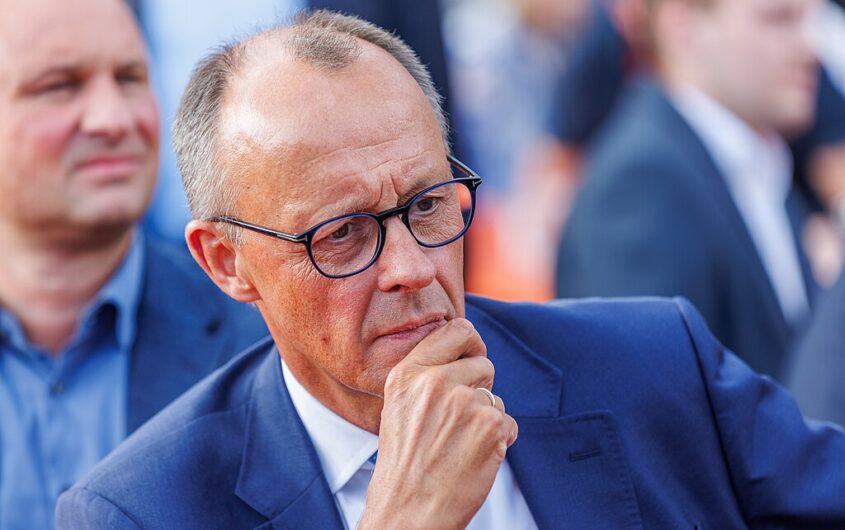
Steffen Prößdorf via Wikimedia Commons
Chancellor Merz and Germany’s ‘New Determination’

Frederik Fink
Halle Foundation/AGI Intern
Frederik Fink is a summer 2025 Halle Foundation Intern at the American-German Institute. Originally from Frankfurt, Germany, he recently completed a bachelor’s degree in history and international relations at King’s College London. His studies focused on the intersection between history and international politics as well as U.S. and UK foreign policy and national security and Russian politics and culture. His undergraduate thesis examined Germany’s policy toward the Western European Union (WEU), analyzing it through the lens of the agency-versus-structure dichotomy.
Frederik has a particular interest in the evolution of German foreign and security policy as well as the dynamics of German-U.S. relations. In 2022, he volunteered with Mission Siret, delivering humanitarian aid to southern Ukraine.

Katharina Schindel
Halle Foundation/AGI Intern
Katharina Schindel is a summer 2025 Halle Foundation Intern at the American-German Institute. She is a rising second year graduate student in the European Studies program at Georgetown University’s School of Foreign Service, pursuing a concentration in international business and transatlantic diplomacy. Originally from Munich, Germany, Katharina earned her BA in political science and sociology from Ludwig-Maximilians-Universität (LMU), where she focused on EU-U.S. relations, and holds a certificate in U.S. politics from American University’s Washington Semester Program.
Prior to her graduate studies at Georgetown, Katharina worked as a project assistant for the Public Affairs Consultancy APCO Worldwide in Munich, where she provided geopolitical risk analysis for international clients in the tech and security space and supported high-profile political events, such as the Munich Security Conference. In addition, Katharina has further experience in transatlantic policy engagement, having previously served as a fellow at the Friedrich Ebert Foundation in Washington, DC.
Her research interests include the security sphere of the transatlantic relationship (specifically as it pertains to Germany and the United States) and shared issues on the emerging tech frontier for both sides of the Atlantic.

Zane Davis
Halle Foundation/AGI Intern
Zane Davis is a summer 2025 Halle Foundation Intern at the American-German Institute. His primary research interests include artificial intelligence policy, labor economics, and global trade.
Prior to joining AGI, Zane completed his bachelor's degree in economics from the University of North Carolina at Chapel Hill, where he also earned minors in German and philosophy. He developed an interest in artificial intelligence and global trade while working for a Munich-based software startup in 2022. In 2023, he relocated to Germany, where he played American football for the Ingolstadt Dukes of the German Football League. Since then, he has worked for organizations spanning the United States, Korea, and Thailand, strengthening his background in public policy and international affairs.
In the fall of 2025, he will return to Chapel Hill to begin the Master of Public Administration program at the UNC School of Government.
In a June 24 address to the German parliament, Chancellor Friedrich Merz delivered a Regierungserklärung (government declaration) that highlighted a profound shift in Germany’s strategic outlook, characterized by what he termed a “new determination” on the global stage. His speech wove together pressing geopolitical challenges in Ukraine and the Middle East with an increased focus on domestic economic revitalization, presenting a renewed image of a Germany prepared to assert its influence and defend its interests on the global stage.
On the volatile situation in the Middle East, Merz reaffirmed Germany’s unshakeable commitment to Israel’s right to self-defense, declaring unequivocally that “Iran must not possess nuclear weapons.” He linked the Hamas October 7 terror attack on Israel directly to Tehran, stating, “Without Iran, October 7, 2023, would not have been possible,” and justified Israeli and U.S. actions against Iranian nuclear facilities as a necessary response to Tehran’s “constant deception” regarding its uranium enrichment. While acknowledging Israel’s existence as a “reason of state” (Staatsräson) of Germany, Merz also called for a ceasefire in Gaza, emphasizing the need to “critically question” Israel’s objectives and ensure “humane treatment of the people.” Notably, he publicly commended Foreign Minister Johann Wadephul’s extensive diplomatic efforts, implicitly downplaying bridging any perceived differences with his foreign minister, who had ruled out a U.S. military strike against Iran on June 17 and subsequently called it “regrettable”—concurrently to Merz’s unequivocal support for Israel, Wadephul had repeatedly urged negotiations. The chancellor also firmly stated that an end to the European Union’s Association Agreement with Israel, as proposed by Spain, Ireland, Slovenia and Malta, is “out of the question.”
Turning to Eastern Europe, Chancellor Merz adopted an uncompromising tone toward Russia. Citing President Putin’s recent assertion that “the whole of Ukraine is ours,” Merz declared that capitulation is “not the peace that we want.” He committed Germany to sharpening sanctions against Moscow and expressed confidence in continued U.S. support. Acknowledging Germany and Europe’s past “mistake” in underestimating the Russian threat, he pledged unwavering commitment to NATO’s collective defense, stating, “The security of Lithuania [where the Merz recently launched the permanent stationing of a Bundeswehr brigade] is also the security of Germany.” In anticipation of the June 24-25 NATO Summit, Merz announced Germany’s unprecedented commitment to invest 5 percent of its GDP in defense and defense-related infrastructure, asserting that since Putin only comprehends “the language of strength,” Germany’s “work of peace” now demands speaking precisely that language. He condemned recent Russian airstrikes on Kyiv, dismissing demands for rapprochement from within the Social Democratic faction as Russia’s “barbaric attacks” proved its unreadiness for peace.
The speech’s foreign policy focus reflects the chancellor’s intention to oversee Germany’s return to the world stage.
Domestically, Merz prioritized economic strength and competitiveness. He highlighted the European domestic market as vital “insurance” against global uncertainty and unveiled an urgent economic program. This initiative focuses on three pillars: improving energy infrastructure to be “affordable, safe, and future-oriented,” fostering swift deregulation with a “new culture of restraint” concerning European bureaucracy, and aggressively pursuing “as many new trade agreements as possible” through efficient “collective European institutions.” Furthermore, the chancellor outlined a significant reform of Germany’s social welfare system, proposing a “new basic income support” with tighter rules for recipients and increased pressure to enter employment, complemented by enhanced job center funding to expedite re-entry into the workforce. On the contentious issue of tariffs, Merz unequivocally stated, “Tariffs serve no one. Tariffs hurt all parties,” expressing hope for an agreement with the United States by the July 9 deadline.
In response, Merz was criticized by the opposition for his administration’s style of crisis communication. Green parliamentary group leader Britta Haßelmann remarked during the debate that the dissonance between Merz and his foreign minister on U.S. attacks in Iran was unmistakable and that she “expected the German government to speak with one voice in this difficult situation.” When speaking on the Iran conflict, she noted, Merz made no mention of international law. Haßelmann addressed this absence directly stating, “We need the strength of the law, not the law of the strongest.” In contrast to his coalition counterpart, the leader of the SPD parliamentary group, Matthias Miersch, also called for compliance with international law, saying that liberal democracies in particular have a “huge interest” in ensuring that rules apply to everyone.
This address was a significant early moment for Merz’s chancellorship, offering a glimpse into Merz’s priorities for his term. The speech’s foreign policy focus reflects the chancellor’s intention to oversee “Germany’s return to the world stage.” Merz’s address also represented a distinct toughening of German policy. Merz emphasized Europe’s strength and the necessity of rearmament to provide for Germany’s defense. Merz’s Regierungserklärung also functioned as a declaration of Germany’s intent to strengthen its defense before heading to the NATO summit in The Hague later that day. The chancellor cast Germany not as a cautious bystander but as a central geopolitical actor, willing and able to confront national security threats and commit to NATO with unprecedented financial resolve. His 5 percent defense pledge and sharp rhetoric toward Russia and Iran signal a new era of German determination.
Yet, even as Merz sought to project cohesion, the fault lines within his own governing coalition were hard to ignore. The SPD’s internal struggles, particularly around the Friedensmanifesto supported by some on its left flank, which calls for a renewed diplomatic track with Russia, threaten to undercut the unified foreign policy front Merz hopes to build. This call for negotiation sits uneasily beside Merz’s stark rejection of rapprochement, especially in light of Russia’s most recent escalations. If parts of his coalition continue to threaten resistance, it could dilute Germany’s foreign policy credibility, just as the chancellor attempts to bolster it.
Friedrich Merz’s second Regierungserklärung focused on foreign policy was, above all, a clear articulation of his vision for Germany’s return to the global stage, though it remains to be seen if the slim majority held by Germany’s governing coalition will be able to provide him the support he will need to see it through.








